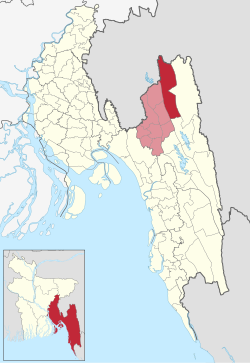Dighinala (Bengali: দীঘিনালা) is an upazila of Khagrachari District[3] in the Division of Chittagong, Bangladesh.
Dighinala
দীঘিনালা | |
|---|---|
 | |
| Coordinates: 23°15.5′N 92°3.5′E / 23.2583°N 92.0583°E | |
| Country | |
| Division | Chittagong |
| District | Khagrachhari |
| Government | |
| • Chairman | Vacant |
| Area | |
| • Total | 694.11 km2 (268.00 sq mi) |
| Population | |
| • Total | 115,440 |
| • Density | 170/km2 (430/sq mi) |
| Time zone | UTC+6 (BST) |
| Postal code | 4420[2] |
| Website | www |
History
editDighinala, the biggest upazila of Khagrachhari zila in respect of area, came into existence in 1916 as a thana and was upgraded to upazila in 1984. It is said that in the long past, Tripura Maharaja Govinda Manikya Bahadur Debbarma dug a big pond (meaning Dighi in Bangla) by the side of a canal (meaning Nala in Bangla). This upazila was under Tripura Kingdom used to known as "Reangdesh" [4]
It is generally believed that the upazila might have originated its name from above two words Dighi and Nala.[5]
Geography
editDighinala Upazila (Khagrachhari district) area 694.11 km2, located in between 23°04' and 23°44' north latitudes and in between 91°56' and 92°11' east longitudes. It is a hilly area. It is bounded by tripura state of India on the north, langadu upazila on the south, baghaichhari upazila on the east, Panchhari and Khagrachhari Sadar upazilas and Tripura state on the west. Golamoon, Karmi Mura, Lutiban, Kuradia hills are notable.
Demographics
editAs of the 2022 Bangladeshi census, Dighinala upazila had a population of 115,440. The ethnic population was 70,420 (61.00%), of which Chakma were 61,618 and Tripura 8,523.[6]
Administration
editUNO: Md. Mamunur Rashid.[8]
Dighinala Upazila is divided into five union parishads: Babuchhara, Boalkhali, Dighinala, Kabakhali, and Merung. The union parishads are subdivided into 20 mauzas and 245 villages.[9]
Economy
editMain sources of income Agriculture 65.53%, non-agricultural labourer 8.51%, commerce 9.70%, service 5.01%, construction 0.42%, religious service 0.20%, rent and remittance 0.10% and others 10.53%.[citation needed]
Ownership of agricultural land Landowner 46.96%, landless 53.04%; agricultural landowner: urban 25.85% and rural 50.57%.[citation needed]
Education
editLiteracy rate and educational institutions Average literacy 47.5%; male 56.1%, female 38%. Educational institutions: Choto Merung High School, DIGHINALA BORADOM HIGH SCHOOL,[3] Dighinala Government College, Dighinala Government High School, Dighinala Model Girls' School, Hashinpur High School, Anath Ashram Abashik High School, Babuchhara High School, Udal Bagan High School, Rasik Nagar Dakhil Madrasa.Trabonia high school
Transport
editCommunication facilities Pucca road 91 km, semi-pucca road 34 km, mud road 280 km.[citation needed]
Extinct or nearly extinct traditional transport Bullock cart. Connected to the zila headquarters by metalled roads. Bus, minibus, three wheelers ply over the upazila. Chander Gari (local four wheeled jeep) is a popular transport used to ply in the hill area of upazila.[3]
Points of interest
edit- Sajek
- 10 No. Jhorna
- Suspension Bridge
- The Dhigi
See also
editReferences
edit- ^ National Report (PDF). Population and Housing Census 2022. Vol. 1. Dhaka: Bangladesh Bureau of Statistics. November 2023. p. 397. ISBN 978-9844752016.
- ^ "Bangladesh Postal Code". Dhaka: Bangladesh Postal Department under the Department of Posts and Telecommunications of the Ministry of Posts, Telecommunications and Information Technology of the People's Republic of Bangladesh. 20 October 2024.
- ^ a b c Atikur Rahman (2012), "Dighinala Upazila", in Sirajul Islam; Ahmed A. Jamal (eds.), Banglapedia: National Encyclopedia of Bangladesh (Second ed.), Asiatic Society of Bangladesh
- ^ "Dighinala: King Manikya's Dighi(lake)".
- ^ "বাংলাদেশ পরিসংখ্যান ব্যুরো".
- ^ a b c Population and Housing Census 2022 - District Report: Khagrachhari (PDF). District Series. Dhaka: Bangladesh Bureau of Statistics. June 2024. ISBN 978-984-475-245-0.
- ^ https://bbs.gov.bd/site/page/2888a55d-d686-4736-bad0-54b70462afda/-
- ^ উপজেলা নির্বাহী অফিসার. 2024-08-26. Archived from the original on 2024-08-26.
- ^ "District Statistics 2011: Khagrachhari" (PDF). Bangladesh Bureau of Statistics. Archived from the original (PDF) on 13 November 2014. Retrieved 14 July 2014.